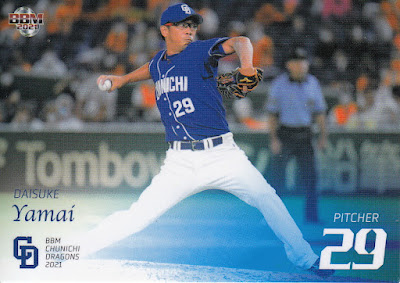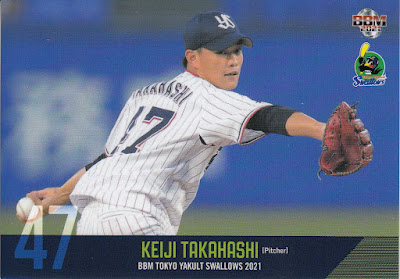 |
| 2002 BBM Japan National Team #30 |
The
Baseball World Cup was a tournament that the International Baseball Federation (IBAF) put on 38 times between 1938 and 2011. It was originally called the "Amateur World Series" and was held annually from 1938 until 1953 - which surprisingly means it was held during World War II. After an eight year gap the tournament started again in 1961 and was held every one to four years after that. The name of the tournament changed to the Baseball World Cup for the 30th tournament which was held in 1988. The IBAF came to an agreement with Major League Baseball in 1998 to allow professional players to play in any of their sanctioned events (like the Olympics) but the timing of the tournament and it's lack of prestige generally precluded most teams from including professionals. The tournament was discontinued after 2011 and replaced with the Premier 12 (and the IBAF merged with the International Softball Federation in 2013 to become the World Baseball Softball Confederation or WBSC).
The 34th IBAF Baseball World Cup was held 20 years ago this month, from November 6th to the 18th in Taiwan. It stands out for two reasons - (1) it's the only Baseball World Cup in which the Japanese team used professionals and (2) it was the first time BBM did cards for the Japanese National team.
The Team
The team was actually a hybrid pro-amateur team similar to the one that had missed out on medalling in Sydney in
the previous year's Olympics. Because the tournament was being held after the end of both the regular season and the Nippon Series that year (the Swallows wrapped up the Series in five games over the Buffaloes on October 25th), the national team was able to work out an arrangement with NPB to get one player from each NPB team. Additionally manager Toshihiko Gotoh added Tadahito Iguchi of the Hawks and Yoshinobu Takahashi of the Giants to the roster because of their previous national team experience - Iguchi had played on the 1996 Olympic team that had taken silver at the Atlanta games and Takahashi was a veteran of several US-Japan collegiate series. They brought the total number of professional players on the roster to 14.
The ten remaining players were split between players from the corporate leagues, college and, surprisingly, high school. The sole high school player was Hayato Terahara, who was the ace pitcher for Nichinan Gakuen High School and gained nationwide recognition while pitching in the 2001 Summer Koshien tournament. There were six collegiate players from four Universities - Yuya Andoh and Taketoshi Gotoh from Hosei, Takao Kinugawa and Shohei Tateyama from Nihon, Yuya Kubo from Tokai and Shingo Maeda from Meiji. Three corporate league players rounded out the roster - Takashi Kurosu from Nissan Motor, Yasuyuki Saigoh from Mitsubishi Fuso Kawasaki and Yoshiteru Sudo from Toshiba. Kurosu and Saigoh had played on the 1996 Olympic team with Iguchi. Here's the entire roster, including the careers of the players post-tournament.
| # |
Position |
Player |
Team |
Draft |
Career |
| 10 |
Catcher |
Abe, Shinnosuke |
Yomiuri Giants |
2000 Giants 1st |
Giants 2001-19 |
| 17 |
Pitcher |
Andoh, Yuya |
Hosei University |
2001 Tigers FA* |
Tigers 2002-17 |
| 23 |
Pitcher |
Fujii, Shugo |
Yakult Swallows |
1999 Swallows 2nd |
Swallows 2000-07, Fighters 2008-09, Giants 2010-11, Baystars 2012-14 |
| 25 |
Infielder |
Gotoh, Taketoshi |
Hosei University |
2002 Lions FA* |
Lions 2003-11, Baystars 2012-18 |
| 1 |
Infielder |
Higashide, Akihiro |
Hiroshima Toyo Carp |
1998 Carp 1st |
Carp 1999-2015 |
| 2 |
Infielder |
Ibata, Hirokazu |
Chunichi Dragons |
1997 Dragons 5th |
Dragons 1998-2013, Giants 2014-15 |
| 7 |
Infielder |
Iguchi, Tadahito |
Fukuoka Daiei Hawks |
1996 Hawks 1st |
Hawks 1997-2004, White Sox 2005-07, Phillies 2007, Padres 2008, Phillies 2008, Marines 2009-17 |
| 43 |
Outfielder |
Kamisaka, Taichiro |
Hanshin Tigers |
1999 Tigers 5th |
Tigers 2000-07 |
| 28 |
Pitcher |
Katoh, Kosuke |
Chiba Lotte Marines |
2000 Marines 2nd |
Marines 2001-07, Buffaloes 2007-08, Baystars 2009-10, Tigers 2011-15 |
| 3 |
Outfielder |
Katsuragi, Ikuro |
Orix BlueWave |
1999 BlueWave 2nd |
BlueWave 2000-03, Tigers 2004-11 |
| 5 |
Outfielder |
Kinugawa, Takao |
Nihon University |
N/A |
Never went professional. Played for Honda |
| 18 |
Pitcher |
Kubo, Yuya |
Tokai University |
2002 Giants FA* |
Giants 2003-15, Baystars 2016, Eagles 2017-20 |
| 20 |
Catcher |
Kurosu, Takashi |
Nissan Motor |
N/A |
|
| 4 |
Infiielder |
Maeda, Shingo |
Meiji University |
2001 Dragons 5th |
Dragons 2002-04 |
| 35 |
Pitcher |
Nakamura, Hayato |
Nippon-Ham Fighters |
2000 Fighters 4th |
Fighters 2001-04, Giants 2004-05, Brothers Elephant 2006 |
| 52 |
Pitcher |
Nakanowatari, Susumu |
Yokohama Baystars |
1999 Baystars 7th |
Baystars 2000-03 |
| 6 |
Infiielder |
Saigoh, Yasuyuki |
Mitsubishi Fuso Kawasaki |
N/A |
|
| 8 |
Outfielder |
Satoh, Tomoaki |
Seibu Lions |
2000 Lions 4th |
Lions 2001-12 |
| 16 |
Pitcher |
Shinohara, Takayuki |
Fukuoka Daiei Hawks |
1997 Hawks 2nd |
Hawks 1998-2009, Baystars 2010-13 |
| 15 |
Pitcher |
Suda, Yoshiteru |
Toshiba |
N/A |
|
| 24 |
Outfielder |
Takahashi, Yoshinobu |
Yomiuri Giants |
1997 Giants 1st |
Giants 1998-2015 |
| 9 |
Outfielder |
Takano, Fumitoshi |
Osaka Kintetsu Buffaloes |
1999 Buffaloes 6th |
Buffaloes 2000-04, Eagles 2005-08 |
| 19 |
Pitcher |
Tateyama, Shohei |
Nihon University |
2002 Swallows 3rd |
Swallows 2003-19 |
| 11 |
Pitcher |
Terahara, Hayato |
Nichinan Gakuen High School |
2001 Hawks 1st |
Hawks 2002-06, Baystars 2007-10, Buffaloes 2011-12, Hawks 2013-18, Swallows 2019 |
*FA in this instance means "free acquisition" which means the player and the team came to an agreement before the draft. I think that the signing of a player under these circumstances means that the team would not have a first or second round pick.
Of the ten non-professional players on the roster, six of them went on to play in NPB. Andoh, Maeda and Terahara were taken in the 2001 draft which was held on November 19th, the day after the tournament ended. Taketoshi Gotoh, Kubo and Tateyama were taken in the 2002 draft. One of the collegiate players, Takao Kinugawa, went on to play for Honda in the corporate leagues and never played in NPB. The three corporate league players on the roster never played in NPB either.
Yuya Kubo was the last active player from the team - he retired at the end of the 2020 season.
 |
| 2002 BBM Japan National Team #29 |
The Tournament
The tournament included sixteen teams that were split into two eight team pools. Japan was in Pool B along with Australia, Canada, Cuba, the Netherlands, Panama, the Philippines and Russia. Pool A included the Dominican Republic, France, Italy, Nicaragua, South Africa, South Korea, Taiwan and the USA. Each team played the other seven teams in its pool with the top four teams in each pool moving on to the single-elimination finals.
Japan started out pool play with a bang, winning their first three games in blowout shutouts that were shorted to seven innings each by the slaughter rule. They beat the Philippines 21-0, Panama 10-0 and Russia 12-0. Cuba presented a more formidable opponent in their next game but the Japanese team proved up to the task, dealing the Cubans their first defeat at the Baseball World Cup since 1986 by a score of 5-3.
They followed that up with their fourth shutout in five games by defeating Australia 8-0 (pregame pictured above). They completed a perfect 7-0 record in pool play with a 6-2 defeat of Canada and 6-5 squeaker against the Netherlands. Japan was the only team to go undefeated in pool play although both Taiwan and Cuba went 6-1.
As the top seed in Pool B, Japan drew South Korea, the fourth seed in Pool A, as their opponent in the quarterfinals of the playoffs. Japan beat their long time rivals, 3-1 to move on to the semifinals and a rematch against Cuba who had beaten the Dominican Republic in their quarterfinal game.
Japan took a first inning 1-0 lead against the Cubans but couldn't push any more runs across the plate. The Cubans tied it up and the game went into extra innings with both starters - Shugo Fujii and Jose Contreras - going into the eleventh inning. Cuba scored two runs in the eleventh to win 3-1, avenging their loss in pool play.
The loss dropped the Japanese team into the bronze medal game against Taiwan. Taiwanese ace Chih-Chia Chang threw a five-hit shutout against them and Taiwan took the bronze medal with a 3-0 win. Chang would go on to play four seasons with the Seibu Lions from 2002-05.
Cuba beat the US in the gold medal game, avenging their loss in the gold medal game in the 2000 Sydney Olympics. It was the Cuban's 23rd Baseball World Cup championship and their seventh in a row.
Japan would go medal-less for the second straight international tournament. They managed to do it in an extremely similar manner to how they finished in Sydney - losing to the Cubans in a semi-final game before losing to another Asian country in the bronze medal game (South Korea in Sydney and Taiwan here).
I believe that this was the third time that the Japanese National team would have a hybrid pro-amateur roster (following the 1999 Asian Championship and the 2000 Sydney Olympics). Japan would go on to use hybrid rosters for the 2002 Asian Games and the 2002 IBAF Intercontinental Cup with mixed results - they won a bronze medal at the Asian Games but came in fifth in the Intercontinental Cup with a 4-4 record. Japan would send purely amateur teams (collegiate and corporate league players) for the five remaining Baseball World Cups (2003, 2005, 2007, 2009 and 2011) while they would send purely professional teams for the other major international tournaments (Olympics, World Baseball Classic and Premier 12).
The Cards
BBM obtained the rights to produce cards for the team. This was the first time they did baseball cards for the National Team. They put out a boxed set in early 2002 that contained 48 cards. There were 28 cards for the players, coaches and manager; two cards for the match results, ten "Starting Member" cards (for the starters in the semi-final game against Cuba), four "Home Run" cards (for players who homered in the tournament), three "Recognized" cards (celebrating the Japanese players named to the All Tournament team) and either a Yoshinobu Takahashi jersey card or a Yoshinobu Takahashi "non-jersey" card - the "non-jersey" card was nine times as likely to be in the box.
Unlike the National Team cards done by Calbee and Upper Deck for the 2000 Olympic team which only included a subset of the players (just the pro players in Calbee's case and just the pro and corporate league players in Upper Deck's case), BBM produced cards of all 24 players on the roster. This means that the set contains "pre-rookie" cards for Andoh, Gotoh, Kubo, Maeda, Tateyama and Terahara.
In addition to the box set, BBM included a 16 card subset in their 2002 1st Version set for the team. This subset, however, only included the 14 players who were professionals at the time of the tournament plus Andoh and Terehara, who had joined the Tigers and Hawks respectively. I have no idea why Maeda, who had joined the Dragons (and appeared in the set as a Dragon), was not also included in the subset.
This is probably a bit of overkill but here's all the cards of the players in the set, including the subset cards, along with all the 2002 1st Version National Team subset cards and a card of the professional players from late in their career. I tried to pick cards for the players in the last year of their NPB career but it wasn't possible in a couple cases. Honestly a couple of these guys barely had any cards beyond these.
 |
| 2002 BBM Japan National Team #15 |
 |
| 2002 BBM Japan National Team #37 |
 |
| 2002 BBM Japan National Team #44 |
 |
| 2002 BBM 1st Version #412 |
 |
| 2019 Epoch NPB #302 |
 |
| 2002 BBM Japan National Team #8 |
 |
| 2002 BBM 1st Version #425 |
 |
| 2016 BBM Tigers #T05 |
 |
| 2002 BBM Japan National Team #11 |
 |
| 2002 BBM Japan National Team #40 |
 |
| 2002 BBM 1st Version #411 |
 |
| 2014 Baystars Team Set #001 |
 |
| 2002 BBM Japan National Team #22 |
 |
| 2018 BBM Baystars #DB53 |
 |
| 2002 BBM Japan National Team #17 |
 |
| 2002 BBM Japan National Team #32 |
 |
| 2002 BBM Japan National Team #45 |
 |
| 2002 BBM 1st Version #415 |
 |
| 2015 BBM Carp #C40 |
 |
| 2002 BBM Japan National Team #18 |
 |
| 2002 BBM Japan National Team #31 |
 |
| 2002 BBM Japan National Team #46 |
 |
| 2002 BBM 1st Version #416 |
 |
| 2015 Calbee #127 |
 |
| 2002 BBM Japan National Team #21 |
 |
| 2002 BBM Japan National Team #33 |
 |
| 2002 BBM Japan National Team #41 |
 |
| 2002 BBM 1st Version #419 |
 |
| 2017 BBM 2nd Version #421 |
 |
| 2002 BBM Japan National Team #28 |
 |
| 2002 BBM Japan National Team #39 |
 |
| 2002 BBM 1st Version #417 |
 |
| 2007 BBM Tigers #T075 |
 |
| 2002 BBM Japan National Team #12 |
 |
| 2002 BBM 1st Version #423 |
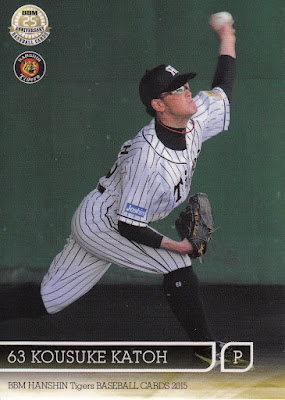 |
| 2015 BBM Tigers #T27 |
 |
| 2002 BBM Japan National Team #23 |
 |
| 2002 BBM Japan National Team #35 |
 |
| 2002 BBM Japan National Team #43 |
 |
| 2002 BBM 1st Version #422 |
 |
| 2010 BBM 1st Version #137 |
 |
| 2002 BBM Japan National Team #24 |
 |
| 2002 BBM Japan National Team #9 |
 |
| 2020 Eagles 1st Version #30 |
 |
| 2002 BBM Japan National Team #16 |
 |
| 2002 BBM Japan National Team #19 |
 |
| 2003 Chunichi Sports #25 (Shingo Maeda) |
 |
| 2002 BBM Japan National Team #13 |
 |
| 2002 BBM 1st Version #424 |
 |
| 2005 BBM Giants #G012 |
 |
| 2002 BBM Japan National Team #14 |
 |
| 2002 BBM 1st Version #414 |
 |
| 2003 BBM 2nd Version #602 |
 |
| 2002 BBM Japan National Team #20 |
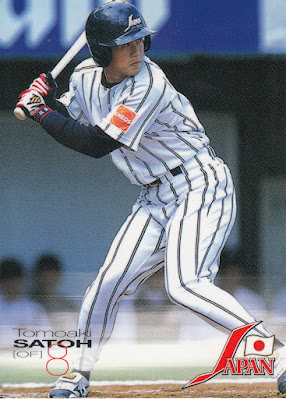 |
| 2002 BBM Japan National Team #25 |
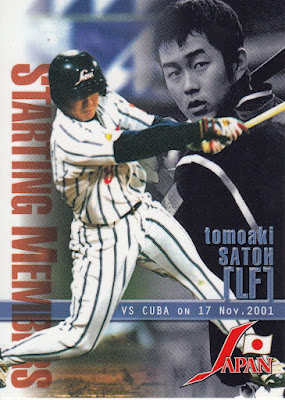 |
| 2002 BBM Japan National Team #38 |
 |
| 2002 BBM 1st Version #421 |
 |
| 2012 BBM Lions #L56 |
 |
| 2002 BBM Japan National Team #7 |
 |
| 2002 BBM 1st Version #420 |
 |
| 2012 Calbee #142 |
 |
| 2002 BBM Japan National Team #6 |
 |
| 2002 BBM Japan National Team #27 |
 |
| 2002 BBM Japan National Team #34 |
 |
| 2002 BBM Japan National Team #47 |
 |
| 2002 BBM Japan National Team #NJC1 ("Non-Jersey Card") |
 |
| 2002 BBM 1st Version #413 |
 |
| 2015 BBM Classic #042 |
 |
| 2002 BBM Japan National Team #26 |
 |
| 2002 BBM Japan National Team #36 |
 |
| 2002 BBM Japan National Team #42 |
 |
| 2002 BBM 1st Version #418 |
 |
| 2007 BBM 1st Version #351 |
 |
| 2002 BBM Japan National Team #10 |
 |
| 2019 BBM Swallows #S13 |
 |
| 2002 BBM Japan National Team #5 |
 |
| 2002 BBM 1st Version #426 |
 |
| 2019 Calbee #118 |
The Coaching Staff
I figured I'd finish off this very long post some quick comments about the coaching staff. It'll give me an excuse to show off the last four cards from the set:
 |
| 2002 BBM Japan National Team #1 |
The team was managed by Toshihiko Gotoh. Gotoh had been a star at Keio University in the mid-70's, winning the Tokyo Big Six Triple Crown for the 1975 spring season. After graduation he joined Mitsubishi Heavy Industries Mihara in the corporate leagues instead of going to NPB and eventually became their manager. He left Mitsubishi to became the manager for Keio in 1994. He resigned his post with Keio to take the National Team position in 2001. Besides the 2001 Baseball World Cup, he also managed the team for the 2002 Asian Games and the 2002 IBAF Intercontinental Cup. Since leaving the National Team he's managed both Seino Transportation and JR West in the corporate leagues. As far as I know, this is his only baseball card.
 |
| 1994 Tomy #158 |
 |
| 2002 BBM Japan National Team #3 |
Pitching coach Daisuke Araki made such a name for himself in the 1980 Summer Koshien tournament that parents all over Japan were naming their babies after him - one of those babies was Daisuke Matsuzaka. He was the Swallows first pick in the 1982 draft and had a 14 year injury-marred career in NPB with Yakult and Yokohama. He coached for the National Team for a couple years before moving on to coach for the Lions, Swallows and Fighters.
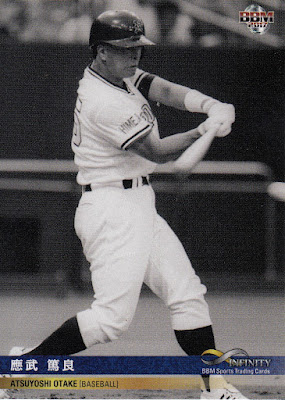 |
| 2017 BBM Infinity #044 |
 |
| 2002 BBM Japan National Team #4 |
Atsuyoshi Ohtake was actually taken in the third round of the 1976 draft by the Kintetsu Buffaloes out of high scholl but decided to go to Waseda University instead and never played in NPB. He joined Nippon Steel Hirohata in the corporate leagues after graduation. He shared catching duties with Atsuya Furuta on the 1988 Olympic team. He managed Nippon Steel Kimitsu from 1994 to 2000 before becoming a coach of the National Team. He would go on to manage Waseda from 2005 to 2010.
 |
| 1977 Yamakatsu JY3 |
 |
| 2002 BBM Japan National Team #2 |
Hitting coach Daisuke Yamashita had also played at Keio University although a little earlier than Gotoh. He was the first pick of Taiyo in the 1973 draft and spent his entire 15 year career with the Whales. He was a four time All Star and won a Best 9 Award in 1981. He coached for the now-Baystars in the mid-90's and would manage the team in 2003-04 and would return as a coach again for a couple years after DeNA bought the team in 2012. He also coached for Rakuten in their inaugural season of 2005.








